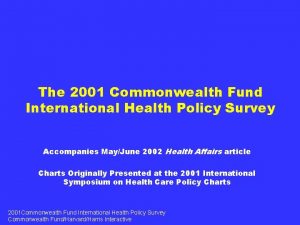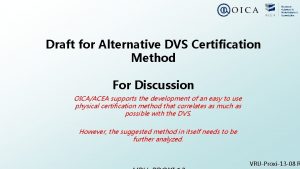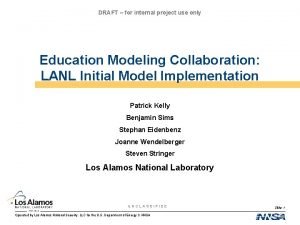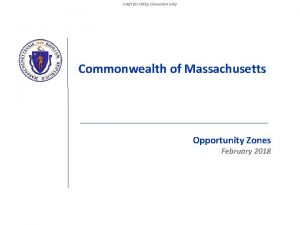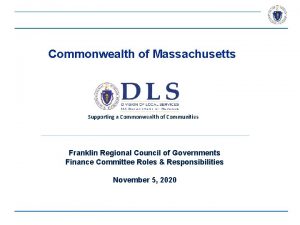Draft for Policy Discussion Only Commonwealth of Massachusetts






- Slides: 6

Draft for Policy Discussion Only Commonwealth of Massachusetts Opportunity Zones February 2018

Summary • The Tax Cut and Jobs Act of 2017 created the Opportunity Zone Program, designed to incentivize investment in low income areas by offering favorable federal tax treatment for investors. • Under the program, Governors may designate up to 25% of low-income community census tracts within their state as Opportunity Zones. • Investors may invest capital gains into these zones, and both defer and reduce their federal tax liability for those capital gains. • These investments must be made through privately-created Opportunity Funds. • This program will have no impact on state tax policy. 2

Benefits for Investors • Investors who choose to invest in these funds defer and reduce their federal tax obligation: • Any capital gains taxes owed on investments into an Opportunity Fund are deferred for up to 8 years, depending on the duration of the investment. • When capital gains taxes are paid, the investor pays taxes on the lesser of the original Opportunity Zone investment, or the fair market value of the investment at the time of claim. • Thus, if the investor sees a loss on the investment into an Opportunity Fund, it reduces the amount of capital gains taxes they pay. • If the investment stays in the Opportunity Fund for 5 years, federal capital gains taxes owed on the original investment are reduced by 10%. If it stays in for 7 years, federal capital gains taxes are reduced by an additional 5%. • If the investment stays in the Opportunity Fund for 10 years, any profits from the fund’s investments do not incur capital gains taxes. If the original investment stays in the fund for less than 10 years, capital gains taxes are due on profits from the fund’s activity. 3

Zone Designation The Commonwealth’s only formal role in the Opportunity Zone Program, as defined in the authorizing legislation, is to designate census tracts as Opportunity Zones. • The Opportunity Zone legislation defines “Low Income Community” census tracts as those tracts with a poverty rate above 20%, or a median family income (MFI) below 80% of the higher of the surrounding MSA MFI or State MFI. • Governors may designate a number of census tracts equal to 25% of the Low Income Community tracts in their state, as of the 2011 -2015 census, as Opportunity Zones. This census data indicates that Massachusetts has 547 Low Income Community tracts, and may therefore designate up to 137 census tracts as Opportunity Zones. • Additionally, implementation guidance allows states to designate tracts that qualify as Low Income Community tracts under the 2016 census, but eligible tracts in this category do not add to the 25% cap. Massachusetts has an additional 31 tracts eligible due to this guidance. • At least 95% of designated tracts must be Low Income Community tracts. The remaining may be tracts that are adjacent to Low Income Community Tracts, and which have an MFI under 125% of the qualifying, adjacent, Low Income Community tract. • Formal designation will be done by the Governor through the U. S. Department of the Treasury, and the Treasury has delivered an online tool to Governors for designation. Once approved by the Treasury, Opportunity Zones will remain in place for 10 years. • Designations will be due to Treasury on March 22 (90 days after the signing of the bill), though it is possible to request a 30 day extension. Treasury will have 30 days to review the designations and finalize zones. 4

Opportunity Funds • In order for an investment to receive preferential federal tax treatment, it must be directed through an Opportunity Fund. • Opportunity Funds are investment corporations or partnerships designed to invest in Opportunity Zones (at least 90% of the fund’s assets must be in designated zones). • There are no statutory restrictions on who can set up an Opportunity Fund, or on their internal structure. The creation and monitoring of Funds will be supervised by Treasury and the IRS. • Funds may invest in businesses, partnerships, or business property, subject to IRS restrictions. • The Opportunity Zone statute includes language that makes it more difficult to acquire, hold, and flip property without making a substantial investment in it. • Opportunity Funds cannot make qualified investments into property that was owned by the fund, or by the controller of a fund, before 12/31/17. 5

Legend Eligible Tracts '11 -'15 Additional Eligible Tracts '12 -'16 Municipal Borders 6



